八年级英语上册 Module 11 Unit 1 In China,we open a gift later教案
外研版八年级上册Module 11 unit1 In China,we open a gift la
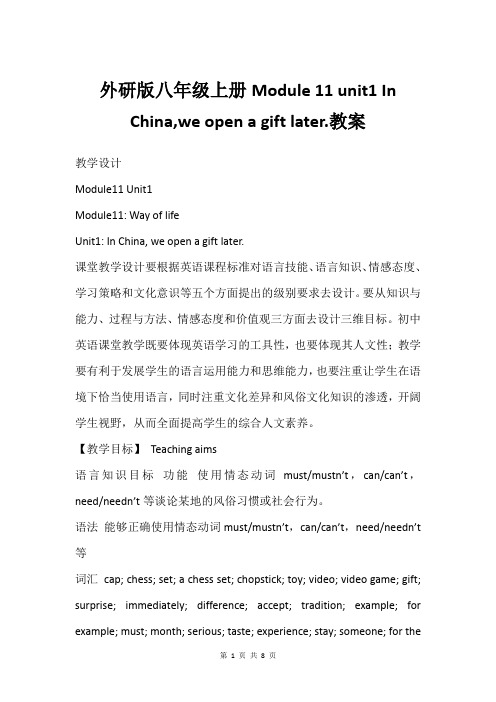
外研版八年级上册Module 11 unit1 In China,we open a gift later.教案教学设计Module11 Unit1Module11: Way of lifeUnit1: In China, we open a gift later.课堂教学设计要根据英语课程标准对语言技能、语言知识、情感态度、学习策略和文化意识等五个方面提出的级别要求去设计。
要从知识与能力、过程与方法、情感态度和价值观三方面去设计三维目标。
初中英语课堂教学既要体现英语学习的工具性,也要体现其人文性;教学要有利于发展学生的语言运用能力和思维能力,也要注重让学生在语境下恰当使用语言,同时注重文化差异和风俗文化知识的渗透,开阔学生视野,从而全面提高学生的综合人文素养。
【教学目标】Teaching aims语言知识目标功能使用情态动词must/mustn’t,can/can’t,need/needn’t等谈论某地的风俗习惯或社会行为。
语法能够正确使用情态动词must/mustn’t,can/can’t,need/needn’t 等词汇cap; chess; set; a chess set; chopstick; toy; video; video game; gift; surprise; immediately; difference; accept; tradition; example; for example; must; month; serious; taste; experience; stay; someone; for thefirst time; sandwich; chip; fish and chips; onto; gentleman; shoulder;语音能够正确朗读情态动词和含有情态动词的句子。
语言技能目标听能够听懂介绍社会习俗或生活习惯的听力材料。
说能够谈论某地的风俗习惯。
外研版八年级英语上册Module 11 unit1 In China,we open a gift later.教案
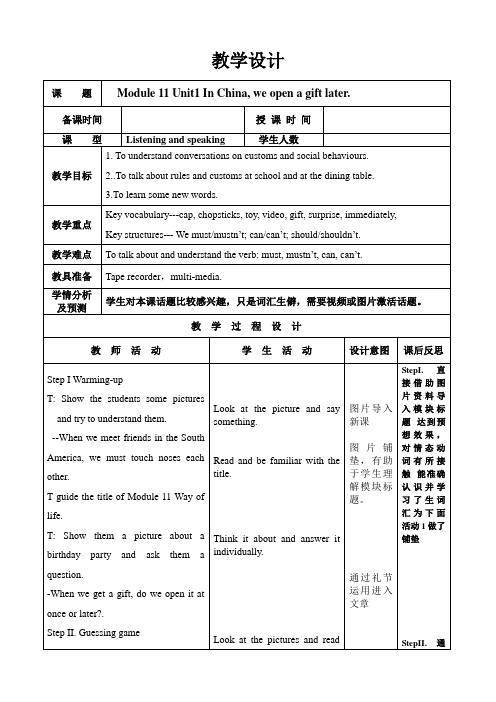
核对每题所有答案整体认知着重强调情态动词的呈现。
Step III学生在Speaking环节范围不受局限,从而汇报内容也会更丰富多样。
课
堂
练
习
Activity 1,2,3,5,7
作
业
布
置
1.Read theconversation as many as possible
2.Make rules for a zoo.
3.Try to find more customs in different places.
板
书
设
计
Module 11 Way of life
Unit 1. In China, we open a gift later.
We must/mustn’t….
教学设计
课题
Module 11 Unit1 In China, we open a gift later.
备课时间
授课时间
课型
Listening and speaking
学生人数
教学目标
1. Tounderstand conversations on customs and social behaviours.
Do as the Romans do!
Try to be a well-behaved person!
Look at the picture and say something.
Read and be familHale Waihona Puke ar with the title.
Think it about and answer it individually.
外研版英语八年级上册 Module11 Unit 1 In China,we open a gift later (共33张PPT)
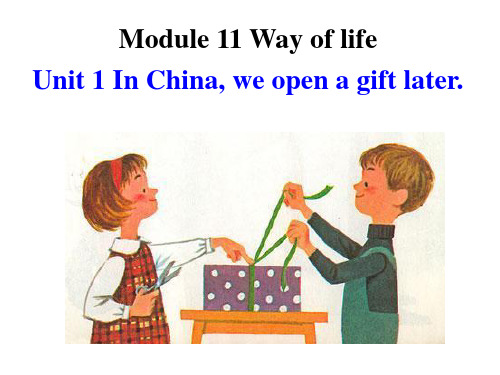
rwecheeinveyiotu. receive it.
√ 22.. YAocucemput sat pacrceespent tawpritehsebnottwhithhabnodtsh. hands.
33.. UYoseurmedusptaupseerrfeodr phaopnegrbafoor. hongbao.
3. Learn some traditions about the Spring Festival in China.
4. Get to know some different customs about accepting a gift in China and Western countries.
√
44.. DYoouclmeaunsitnng’todnotahneyficrlsetadnainygoof nthteheSpfirrisntg ×
Fdeasytiovfalt.he Spring Festival.
55.. BYoreuamk usosmtne’thbirnegakduarninytghtihneg Sdpurriinngg the ×
school. I mustn’t watch TV on school nights.
must
mustn’t
get home on time watch TV on school
after school
nights
help with the
play computer for
housework
We __m__u_s_t_ listen to the teacher
carefully.
must or mustn’t?
Module11Unit1 InChinaweopenagiftlater课件八年级英语上册
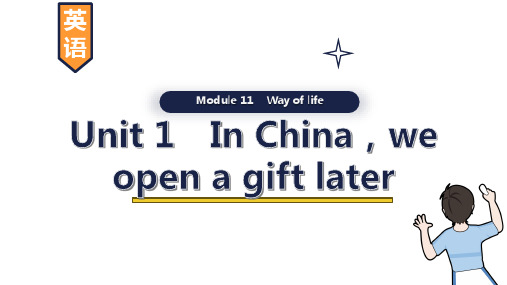
Module 11 Way of life
词汇导学
序 单词
号
词性及中文释义
拓展与运用
n.(同类事物的) a chess set一副国际象棋
1 set (一)套,(一) a set of+n.一套……;一
副,(一)组
副……;一组……
n.惊奇;意外之事 2 surprise v.使(某人)吃惊 give sb.a surprise
词汇导学
序 号
单词
词性及中文释义
拓展与运用
3 difference n.差别;差异 4 accept v.收受;接受
There are many differences between American English and British English. different adj.不同的 My dictionary is very different from yours.
is ( 1 ) usually
from June to September.During this
vacation,students often travel or have jobs.Some students take
courses in (2) summer schools.Mary (3) spent her
基础达标
二、单项选择。
( B )1.When you accept a present in China,
you
use both hands.
A.may
B.should
C.can
D.could
( B )2.A student must always
his homework on
外研版英语八年级上册 Module11 Unit 1 In China,we open a gift later (共33张PPT)

carefully.
must or mustn’t?
I’m sorry I’m late. May I come in?
We _m__u_s_tn__’t_ be late for school.
must or mustn’t?
Tony: You can open it!
Lingling: I don’t think I should open it now. In China, we open a gift later.
Betty: But back in the US, we open a gift
immediately.
/kæp/ a baseball cap
(some) chocolate
/ˈtʃɒpstɪk/ (a pair of) chopsticks
2 Match the words and expressions in
Activity 1 with the pictures.
a
b
g baseball cap
We __m__u_s_t_ wear
school uniforms every day.
We like our school uniforms
(校服).
must or mustn’t?
I’m dreaming. Don’t wake me up!
We _m__u_s_t_n_’_t sleep in class.
must
mustn’t
go to school on time get on well with each
other do homework everyday study hard
八年级英语上Module 11 Unit 1 In China,we open a gift lat

Lingling: So what do I do? Betty: You needn't wait! (Lingling opens her present and finds a dictionary.) Lingling: Oh, thank you. I really wanted one. Betty: We're happy you like it. Tony: I noticed another difference. In China, you accept a gift with both hands. But in the west, we usually don't pay much attention to that.
Daming: You must only use red paper for hongbao because red means luck. And you'd better not cut your hair during the Spring Festival month. Betty: That's interesting! I'm interested to know all the Chinese traditions. Tell me more.
receive it.
2. Accept a present with both hands.
√
3. Use red paper for hongbao.
√
4. Do cleaning on the first day of the Spring Festival.
5. Break something during the Spring Festival.
外研版英语八年级上册Module11Unit1InChina,weopenagiftlater课件

Spring Festival. 6. You need have your hair cut during the
Spring Festival month.
Think about what you must and mustn’t/ can’t do in the P89 7 situations. Write notes.
of
wdinone't ipsayemnuocuhgathte.ntion
to that
We should learn to accept and respect different traditions. When in Rome, do as the Romans do.
P88 3
Check (√) what you usually do in China.
Visiting people
Check (√) what you usually do in China.
She likes it.
In the West
B:I can get a gift / present….
√ gift / present
an English dictionary Think about what you must and mustn’t/ can’t do in the situations.
a toy
a chess set
chocolate some nice chopsticks video game a baseball cap
an English dictionary
人教版英语八年级上册module 11 unit 1 in china, we open a gift later
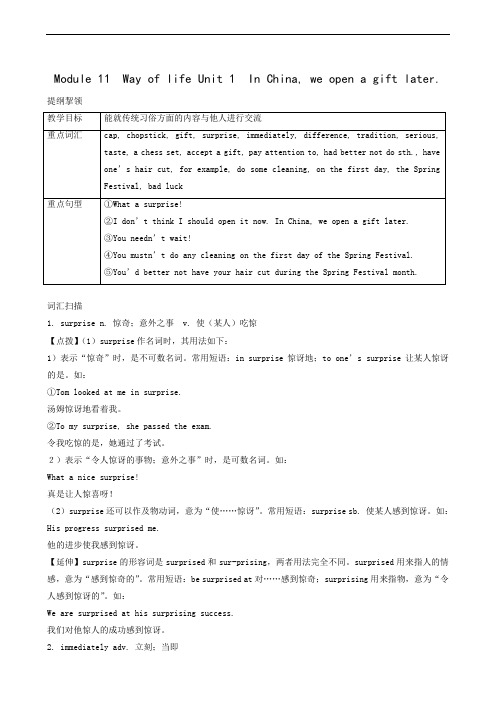
Module 11 Way of life Unit 1 In China, we open a gift later. 提纲挈领词汇扫描1. surprise n. 惊奇;意外之事 v. 使(某人)吃惊【点拨】(1)surprise作名词时,其用法如下:1)表示“惊奇”时,是不可数名词。
常用短语:in surprise惊讶地;to one’s surprise让某人惊讶的是。
如:①Tom looked at me in surprise.汤姆惊讶地看着我。
②To my surprise, she passed the exam.令我吃惊的是,她通过了考试。
2)表示“令人惊讶的事物;意外之事”时,是可数名词。
如:What a nice surprise!真是让人惊喜呀!(2)surprise还可以作及物动词,意为“使……惊讶”。
常用短语:surprise sb. 使某人感到惊讶。
如:His progress surprised me.他的进步使我感到惊讶。
【延伸】surprise的形容词是surprised和sur-prising,两者用法完全不同。
surprised用来指人的情感,意为“感到惊奇的”。
常用短语:be surprised at对……感到惊奇;surprising用来指物,意为“令人感到惊讶的”。
如:We are surprised at his surprising success.我们对他惊人的成功感到惊讶。
2. immediately adv. 立刻;当即【点拨】immediately是副词,作状语,相当于at once或right now。
如:①She answered almost immediately.她几乎立刻就回答了。
②You must hand in your homework imme-diately.=You must hand in your homework at once/right now.你必须立即上交你的作业。
八年级英语上册册module 11 unit 1 in china we open
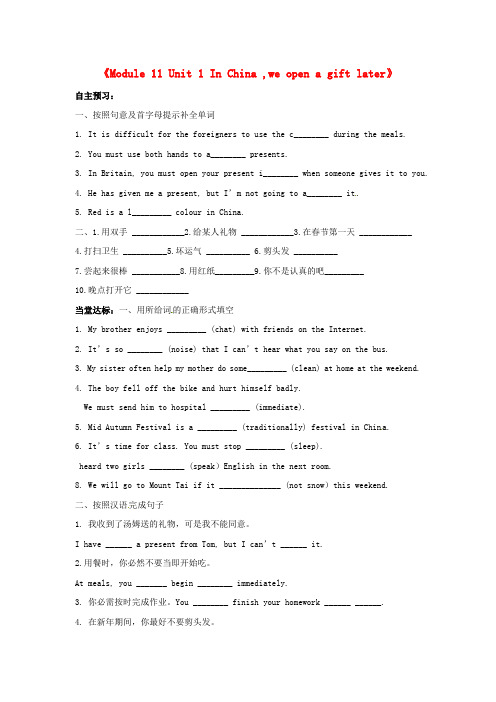
《Module 11 Unit 1 In China ,we open a gift later》自主预习:一、按照句意及首字母提示补全单词1. It is difficult for the foreigners to use the c________ during the meals.2. You must use both hands to a________ presents.3. In Britain, you must open your present i________ when someone gives it to you.4. He has given me a present, but I’m not going to a________ it.5. Red is a l_________ colour in China.二、1.用双手 ____________2.给某人礼物 ____________3.在春节第一天 ____________4.打扫卫生 __________5.坏运气 __________6.剪头发 __________7.尝起来很棒 ___________8.用红纸_________9.你不是认真的吧_________10.晚点打开它 ____________当堂达标:一、用所给词的正确形式填空1. My brother enjoys _________ (chat) with friends on the Internet.2. It’s so ________ (noise) that I can’t hear what you say on the bus.3. My sister often help my mother do some_________ (clean) at home at the weekend.4. The boy fell off the bike and hurt himself badly.We must send him to hospital _________ (immediate).5. Mid Autumn Festival is a _________ (traditionally) festival in Chin a.6. It’s time for cl ass. You must stop _________ (sleep).heard two girls ________ (speak)English in the next room.8. We will go to Mount Tai if it ______________ (not snow)this weekend.二、按照汉语完成句子1. 我收到了汤姆送的礼物,可是我不能同意。
外研版英语八年级上册Module-11单元知识点归纳总结(详细版)
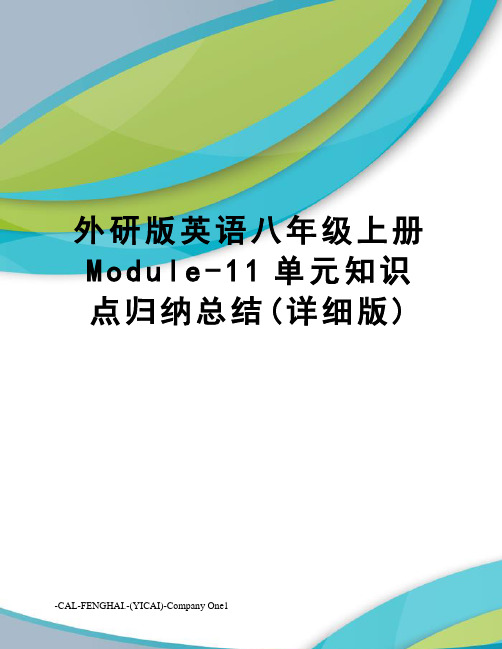
外研版英语八年级上册M o d u l e-11单元知识点归纳总结(详细版) -CAL-FENGHAI.-(YICAI)-Company One1Module11 Way oflifeUnit1 In China, we open a gift later.1.It’s cool to wear a cap back-to-front.把鸭舌帽前后反过来戴很酷。
2.If she is interested in playing chess, it’s a good idea to choose a chess set as a present.3. We Chinese usually have meals with chopsticks/ while Westerners(西方人) use knives and forks for meals.This pair of chopsticks is pretty nice.(谓语是由pair决定的)A knife and fork ___ on the table now. (is)a knife and fork 一副刀叉表示一个整体,用单数。
4.A bar of chocolate is a perfect choice for those who prefer(更喜欢) sweet food.5.Students need to look up new words in dictionaries to improve their study.6. Little babies would like to play with toys.7. Video games are not popular with teenagers any longer now. 现在电子游戏不再受青少年欢迎了。
8. Here’s your gift.H ere’s the change(找头,零钱)/money.Here are some flowers for you.9. What a big surprise! n.1)in surprise “惊奇地”常位于动词之后作状语,表示方式。
外研版八年级英语上册Module 11 unit1 In China,we open a gift
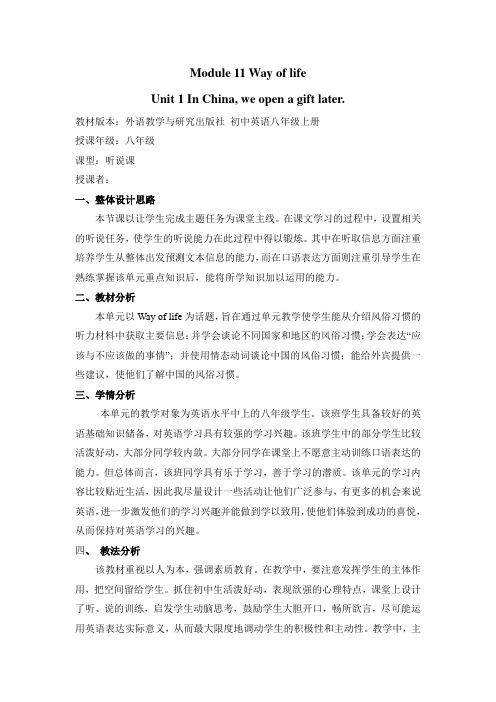
Module 11 Way of lifeUnit 1 In China, we open a gift later.教材版本:外语教学与研究出版社初中英语八年级上册授课年级:八年级课型:听说课授课者:一、整体设计思路本节课以让学生完成主题任务为课堂主线。
在课文学习的过程中,设置相关的听说任务,使学生的听说能力在此过程中得以锻炼。
其中在听取信息方面注重培养学生从整体出发预测文本信息的能力,而在口语表达方面则注重引导学生在熟练掌握该单元重点知识后,能将所学知识加以运用的能力。
二、教材分析本单元以Way of life为话题,旨在通过单元教学使学生能从介绍风俗习惯的听力材料中获取主要信息;并学会谈论不同国家和地区的风俗习惯;学会表达“应该与不应该做的事情”;并使用情态动词谈论中国的风俗习惯;能给外宾提供一些建议,使他们了解中国的风俗习惯。
三、学情分析本单元的教学对象为英语水平中上的八年级学生。
该班学生具备较好的英语基础知识储备,对英语学习具有较强的学习兴趣。
该班学生中的部分学生比较活泼好动,大部分同学较内敛。
大部分同学在课堂上不愿意主动训练口语表达的能力。
但总体而言,该班同学具有乐于学习,善于学习的潜质。
该单元的学习内容比较贴近生活,因此我尽量设计一些活动让他们广泛参与,有更多的机会来说英语,进一步激发他们的学习兴趣并能做到学以致用,使他们体验到成功的喜悦,从而保持对英语学习的兴趣。
四、教法分析该教材重视以人为本,强调素质教育。
在教学中,要注意发挥学生的主体作用,把空间留给学生。
抓住初中生活泼好动,表现欲强的心理特点,课堂上设计了听、说的训练,启发学生动脑思考,鼓励学生大胆开口,畅所欲言,尽可能运用英语表达实际意义,从而最大限度地调动学生的积极性和主动性。
教学中,主要通过启发式教学、任务型教学、情景教学等方法精讲巧练,由浅入深,由易到难,由已知到未知,循序渐进地深化教学内容,展开以教师为主导,以学生为主体的师生双边活动。
外研版英语八年级上册Module11Unit1InChina,weopenagiftlater

n. 味道;滋味
Words review
video adj. (电子)视频的 video game 电子游戏
gift n. 礼物 surprise n. 惊奇;意外之事
v. 使(某人)吃惊 immediately adv. 立刻;当即
difference n. 差别;差异 accept v. 收受;接受
This is a _d_i_c_ti_o_n_a_rin it.
This is a _v_i_d_e_o_g_a_m__e_. We can play with it.
Words review
• cap • chess • set
• a chess set • chopstick • toy
jiaozi. They (5) ___ta_s_t_e__ great.
Task 7
Complete the table about different behaviours between China and the West.
Phrases: a chess set video game pay attention to for example have one’s hair cut
Patterns: 1. You can open it! 2. I don’t think I should open it now. In China, we open a gift later. 3. You needn’t wait! 4. … you mustn’t do any cleaning on the first day of the Spring Festival./ 5. You can’t be serious!
八年级英语上册 Module 11 Unit 1 In China ,we open a gift later教案
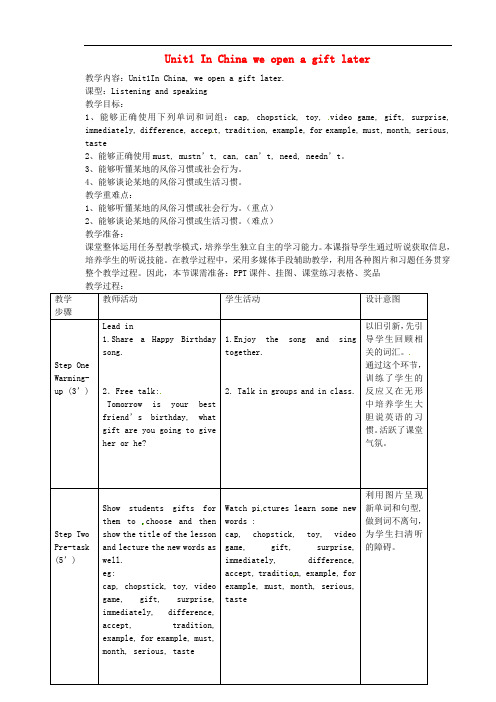
Unit1 In China we open a gift later教学内容:Unit1In China, we open a gift later.课型:Listening and speaking教学目标:1、能够正确使用下列单词和词组:cap, chopstick, toy, video game, gift, surprise,immediately, difference, accep t, tradit ion, example, for example, must, month, serious, taste2、能够正确使用must, mustn’t, can, can’t, need, needn’t。
3、能够听懂某地的风俗习惯或社会行为。
4、能够谈论某地的风俗习惯或生活习惯。
教学重难点:1、能够听懂某地的风俗习惯或社会行为。
(重点)2、能够谈论某地的风俗习惯或生活习惯。
(难点)教学准备:课堂整体运用任务型教学模式,培养学生独立自主的学习能力。
本课指导学生通过听说获取信息,培养学生的听说技能。
在教学过程中,采用多媒体手段辅助教学,利用各种图片和习题任务贯穿整个教学过程。
因此,本节课需准备:PPT课件、挂图、课堂练习表格、奖品教学过程:教学步骤教师活动学生活动设计意图Step One Warming-up (3’)Lead in1.Share a Happy Birthdaysong.2.Free talk:Tomorrow is your bestfriend’s birthday, whatgift are you going to giveher or he?1.Enjoy the song and singtogether.2. Talk in groups and in class.以旧引新,先引导学生回顾相关的词汇。
通过这个环节,训练了学生的反应又在无形中培养学生大胆说英语的习惯。
外研版英语八年级上册Module11Unit1InChina,weopenagiftlater课件
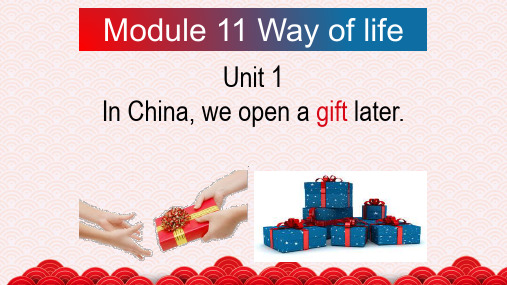
Possible answers:
Must
Mustn’t/Can’t
At school
put up your hand before you talk
eat in class
NowAwt toherk in pwaaiirtsfotrootmhearsketo shotarltk with food in
...
What gift / present would you like to get ?
…
video game
baseball cap
gift / present
chess set
toy chocolate
chopsticks
Listen and number the words and expressions as you hear them.
dbiaffseerbeanltl tcrapditions IcnhothpestUicSk,sa small gift like a bunch of flowers, a book or a bottle of wine is enough.
3. You had better use red paper for hongbao. WShheact atrnadpiltaioynist.are they talking about?
She clikaenseiat.t with them.
√
SCuhgegceks(t√io) nwshat you usually do in China.
4. You shouldn't do cleaning on the first day of P=roigshsitbnleowan=sawt oenrsc:e
外研版英语八年级上册 Module11 Unit 1 In China,we open a gift later 学案
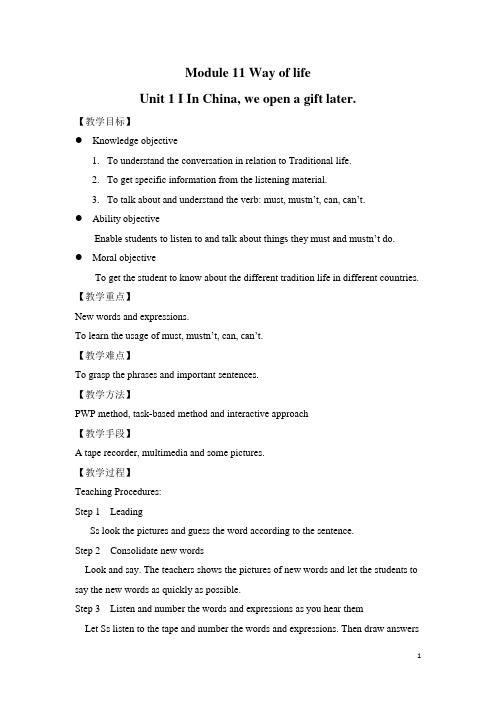
Module 11 Way of lifeUnit 1 I In China, we open a gift later.【教学目标】●Knowledge objective1.To understand the conversation in relation to Traditional life.2.To get specific information from the listening material.3.To talk about and understand the verb: must, mustn’t, can, can’t.●Ability objectiveEnable students to listen to and talk about things they must and mustn’t do.●Moral objectiveTo get the student to know about the different tradition life in different countries. 【教学重点】New words and expressions.To learn the usage of must, mustn’t, can, can’t.【教学难点】To grasp the phrases and important sentences.【教学方法】PWP method, task-based method and interactive approach【教学手段】A tape recorder, multimedia and some pictures.【教学过程】Teaching Procedures:Step 1 LeadingSs look the pictures and guess the word according to the sentence.Step 2 Consolidate new wordsLook and say. The teachers shows the pictures of new words and let the students to say the new words as quickly as possible.Step 3 Listen and number the words and expressions as you hear themLet Ss listen to the tape and number the words and expressions. Then draw answersfrom the students.Step 4 Match the words and expressions in Activity 1 with the picturesRead the words and expressions and choose the right pictures.Step 5 Listen to Activity 1 and answer the questionsListen and answer the question: What present do they want to buy for Lingling? Step 6 Read the dialogue and answer the questions1.When can people open the present in China?2.Where must people open the present immediately?3.Do people accept a present with both hands in the West?Step 7 Now check(√) what you usually do in ChinaStep 8 Complete the passage with the correct form of the words from the box Read the passage and fill in the blanks with the correct form of the words.Step 9 Everyday EnglishOh, you remembered!What a surprise!It’s a bad luck!You can’t be serious!Perfect!Step 10 Language pointLet Ss master the main points of the passage.Step 11 Read and predict how the speaker will the underlined words1. I don’t think I should open it now.2. You needn’t wait!3. You mustn’t break anything.4. You must only use red paper for hongbao.5. You’d better not have your hair cut during the Spring Festival month.Step 12 Now listen and checkCheck what you have listened.Step 13 ReadingWork in pairs. Read the conversation in Activity 5 aloud.Step 14 Complete the table1. Think about what you must and mustn’t/can’t do in the situations. Write notes.2. Now work in pairs. Say what you must and must n’t/can’t do.Step 15 Grammarmust/can的用法。
八年级英语上册-Module-11-Way-of-life-Unit-1-In-China--we-
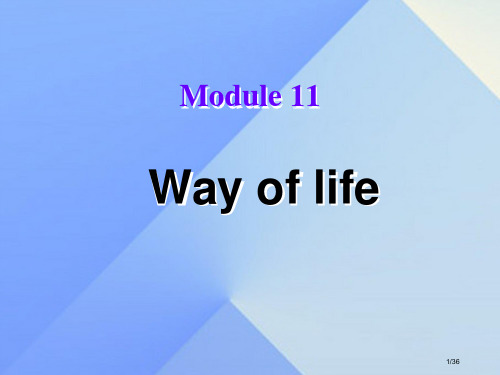
a chess set video game for example
n. 月份,月 adj. 认真严厉,不开 玩笑 v. 有……味道 n. 味道,滋味 一副国际象棋 电子游戏 比如
8/36
Objectives:
1.To listen and understand the conversation about rules and customs
Module 11
Way of life
1/36
Unit 1
In China, we open a gift later.
2/36
Review
Words and expressions
3/36
Read the words and expressions loudly.
5/36
Words and expressions
28/36
√
You _m_u_s_t _c_le_a_n_ the floor with a__m__o_p (拖把). You _c_a_n_’_ _c_le_a_n_ the floor with a towel (毛巾t).
29/36
Quiz
一、单项填空。
1. You have already tried your best, so
17/36
Check (√) what you usually do in China.
1. Open a present immediately when you receive it.
√2. Accept a present with both hands. √3. Use red paper for hongbao.
八年级英语上册 Module 11 Way of life Unit 1 In China ,we
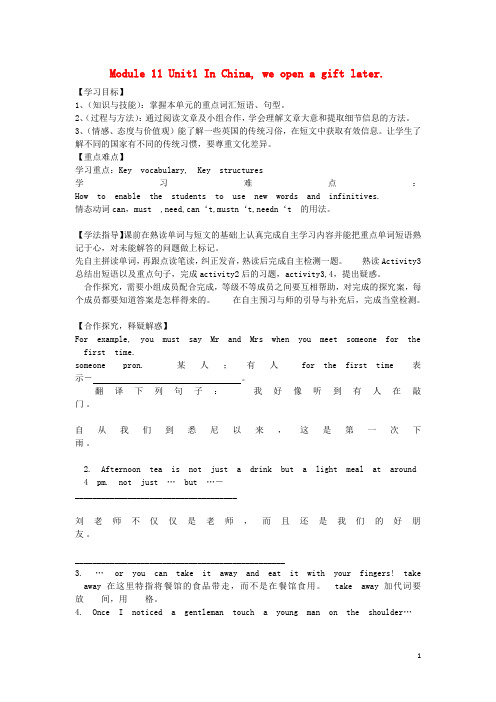
Module 11 Unit1 In China, we open a gift later.【学习目标】1、(知识与技能):掌握本单元的重点词汇短语、句型。
2、(过程与方法):通过阅读文章及小组合作,学会理解文章大意和提取细节信息的方法。
3、(情感、态度与价值观)能了解一些英国的传统习俗,在短文中获取有效信息。
让学生了解不同的国家有不同的传统习惯,要尊重文化差异。
【重点难点】学习重点:Key vocabulary, Key structures学习难点:How to enable the students to use new words and infinitives.情态动词can,must ,need,can‘t,mustn‘t,needn‘t 的用法。
【学法指导】课前在熟读单词与短文的基础上认真完成自主学习内容并能把重点单词短语熟记于心,对未能解答的问题做上标记。
先自主拼读单词,再跟点读笔读,纠正发音,熟读后完成自主检测一题。
熟读Activity3总结出短语以及重点句子,完成activity2后的习题,activity3,4,提出疑惑。
合作探究,需要小组成员配合完成,等级不等成员之间要互相帮助,对完成的探究案,每个成员都要知道答案是怎样得来的。
在自主预习与师的引导与补充后,完成当堂检测。
【合作探究,释疑解惑】For example, you must say Mr and Mrs when you meet someone for the first time.someone pron. 某人;有人for the first time表示―。
翻译下列句子:我好像听到有人在敲门。
自从我们到悉尼以来,这是第一次下雨。
2. Afternoon tea is not just a drink but a light meal at around 4 pm. not just …but …―_____________________________________刘老师不仅仅是老师,而且还是我们的好朋友。
- 1、下载文档前请自行甄别文档内容的完整性,平台不提供额外的编辑、内容补充、找答案等附加服务。
- 2、"仅部分预览"的文档,不可在线预览部分如存在完整性等问题,可反馈申请退款(可完整预览的文档不适用该条件!)。
- 3、如文档侵犯您的权益,请联系客服反馈,我们会尽快为您处理(人工客服工作时间:9:00-18:30)。
In China, we open a gift later
教学目标To understand conversations on customs and social behaviours.
To listen for specific information
To talk about rules and customs at school and at the dining table
教学重点能正确朗读和使用情态动词must mustn’t can can’t need needn’t ha d better
教学难点The key vocabulary and act out the conversatio ns
学情分析The students have learnt some words and expressions. But they don’t know how to ask and answer questions about giving presents to others
学法指导Listening and speaking
教学过程
教学内容教师活动学生活动效果预测(可能出现补救措施修改意见
爱心责任奉献
的问题)
1 The new words
2 Warming-up
3Listen and read
4 Activity 4 5Activity
5 呈现生词,纠正学生的发音,
Talk about what do you want to
buy for someone’birthday?
Ask stude nts to read the
conversation. Play the
recording. Ask students
whether they will get
presents on their birth days.
Complete the passage with the
words in the box
Read and prono unce the
underlined words.
自己拼读单词,抽学生示范朗
读,集体齐读
Match the words and
expressions in Activity 1
with the pictures. What
present do they want to buy
for lingling?
Listen and read the dialogue.
Put the students in pairs to
practice the dialogue.
Read through the words in the
box. Check and cemonstrate
their meaning. Elicit answers
in full sentences.
Read the sentences
individually and pay
attention to how the speaker
pronounces the words
部分学生部分单词不
会读
对听力材料不能完全
听懂
All the students
can match the words
with their things.
不注意句子的时态和
语态
All the students can
do it correctly.
问同学,问老师
平时多听
反复强化训练
爱心责任奉献
爱心责任奉献。
